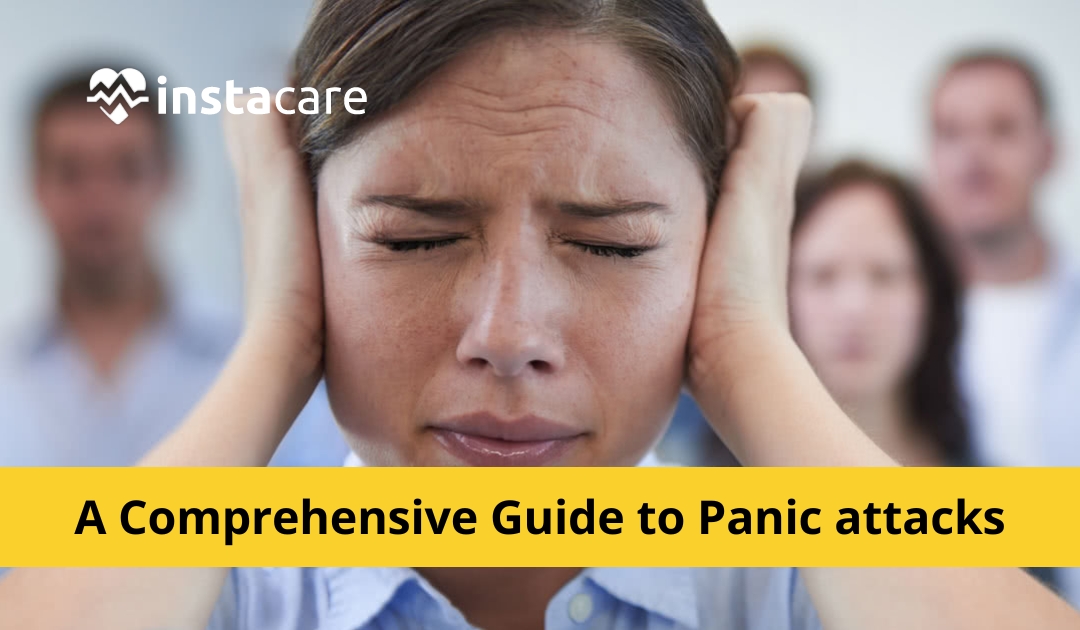Are you afraid of having a panic attack? If so, it’s important to remember that you are not alone. Panic attacks can be incredibly frightening and overwhelming experiences, but this guide is here to provide you with information on how to both prevent them from occurring in the first place as well as treatment options if an attack does happen. Whether you’re male or female, this guide will help you understand why panic attacks can occur and what steps can be taken to deal effectively with the physical and psychological symptoms associated with them. Together we'll review tools such as Cognitive Behavioral Therapy (CBT), breathing techniques, yoga exercises, lifestyle changes, medications & supplements therapy, relaxation strategies and more - providing guidance every step of the way towards helping bring control back to your life.
What Is Panic Attacks?
Panic attacks are sudden periods of intense fear or discomfort that come without an apparent cause. They are often accompanied by physical symptoms, such as shortness of breath, chest pain, sweating, trembling, and racing heart. Panic attacks can be extremely distressing, and they may interfere with normal everyday activities.
They can strike people of any age, and while they can be a one-time occurrence, they can also happen regularly and be a sign of a panic disorder. Panic attacks can be treated with medication, therapy, or a combination of the two, and seeking help is essential for effective management of the condition.
Causes Of Panic Attacks
Panic attacks can be a frightening experience for anyone who suffers from them. A sudden onset of intense fear or anxiety that can leave a person feeling helpless and out of control. Understanding the causes of panic attacks is an important step towards managing and preventing them. One possible cause is genetics, as panic disorder seems to run in families. Another possible cause is changes in brain chemistry, specifically imbalances in serotonin and norepinephrine.
Life stressors, such as trauma or major life changes, can also contribute to panic attacks. Finally, some medical conditions and medications have been known to trigger panic attacks in some individuals. By identifying potential causes, individuals can better understand and manage their panic attacks.
Symptoms Of Panic Attacks
Panic attacks can be a distressing experience for those who experience them. They typically come on suddenly and unexpectedly, often without any specific trigger. The symptoms can vary from person to person but may include a racing heartbeat, shortness of breath, sweating, trembling, and feelings of impending doom or intense fear. These physical symptoms can be accompanied by psychological symptoms such as irrational thoughts, feelings of detachment or unreality, and difficulty concentrating.
It's essential to seek help if you experience frequent panic attacks as they can significantly impact your quality of life and lead to other mental health conditions such as social anxiety disorder or agoraphobia. Understanding your symptoms and how to manage them is the first step towards taking control of your panic attacks and improving your overall well-being.
Diagnosis Panic Attacks
Panic attacks can be truly frightening experiences. They often come on suddenly, with no apparent trigger, and can leave the sufferer feeling as though they are in danger or going crazy. Symptoms include rapid heart rate, sweating, trembling, difficulty breathing, and a sense of impending doom. Despite the severity of these symptoms, panic attacks are actually quite common - in fact, around one in four people will experience at least one panic attack in their lifetime.
If you have experienced a panic attack, it's important to seek a proper diagnosis so that you can begin receiving treatment and start to feel better. A diagnosis of panic attacks may be given by a medical professional following an assessment of your symptoms and medical history, and can help you to understand what is happening in your body and mind during an attack. With the right diagnosis and treatment, it is possible to manage panic attacks and reduce their impact on your life.
Criteria For Diagnosis Of Panic Disorder
Panic disorder is a genuine mental health condition that can cause an individual to experience panic attacks frequently. The diagnosis of this disorder relies mainly on an individual's medical and psychological history, symptoms, and test results. The Diagnostic and Statistical Manual of Mental Disorders, Fifth Edition (DSM-5), outlines the criteria that doctors utilize to diagnose this disorder.
Panic disorder symptoms include tightness in the chest, extreme sweating, dizziness, shortness of breath, and a rapid heart rate. The symptoms must be persistent and recurrent, leaving the person feeling anxious and overwhelmed for no apparent reason. Effective treatment and management of panic disorder often require the right diagnosis, so individuals with suspected symptoms should seek immediate medical attention.
Panic Attacks Treatment
1- Psychotherapy
Psychotherapy is a form of mental health treatment that can help individuals struggling with a variety of conditions. One such condition that can benefit from psychotherapy is panic attacks. Panic attacks can be a distressing experience, filled with feelings of fear and overwhelming anxiety. However, through psychotherapy, individuals can learn coping mechanisms and strategies to manage these attacks.
Therapists can provide a safe space for individuals to discuss their panic attacks and understand the root causes of their anxiety. Furthermore, therapists may use different approaches, such as cognitive-behavioral therapy (CBT), to teach individuals how to challenge negative thoughts and behaviors that contribute to their panic attacks. By undergoing psychotherapy, individuals can take an active step towards improving their mental health and overcoming the challenges of panic attacks.
2- Medications
Medications can play a crucial role in the treatment of panic attacks. Panic attacks can be debilitating and overwhelming, leaving individuals feeling helpless. However, there are several medications available that have been shown to effectively manage the symptoms of panic attacks. Some of the most commonly used medications include selective serotonin reuptake inhibitors (SSRIs), benzodiazepines, and beta-blockers. SSRIs are antidepressants that work by increasing the levels of serotonin in the brain, which can help regulate mood and reduce anxiety.
Benzodiazepines, on the other hand, are fast-acting anti-anxiety medications that can provide immediate relief during a panic attack. Beta-blockers are often used to treat heart conditions, but they can also be effective in managing the physical symptoms of panic attacks, such as rapid heartbeat and tremors. Overall, medications can be an important component of a comprehensive treatment plan for panic attacks.
View More: What Is 4-7-8 Breathing - How It Works How To Do It
3- Breathing Exercise For Panic Attacks
Panic attacks can be extremely overwhelming and debilitating. However, there are several ways to manage and treat them. One effective treatment option is a breathing exercise. By focusing on deep and controlled breathing, individuals experiencing panic attacks can help regulate their heart rate and reduce feelings of anxiety.
This technique has been proven to be an effective and practical solution for panic attacks treatment. The best part? It can be done anywhere, anytime, and by anyone. So, if you’re looking for a natural and simple way to manage your panic attacks, give this breathing exercise a try.
Is It Panic Disorder?
Panic disorder can be a debilitating condition that affects millions of people worldwide, causing unexpected and often intense bouts of fear and anxiety that can often lead to panic attacks. While many people may experience the occasional bout of anxiety or worry, panic disorder is something that requires specific treatment and care. There are a number of different treatment options available for panic disorder, including therapy, medication, and self-help techniques that can be very effective in helping individuals learn to manage their symptoms and regain control of their lives.
Whether you're dealing with this condition yourself or you're looking for information to help a loved one who is struggling with panic attacks, it's important to know that there is help available and that you can take positive steps towards managing this condition and living a fulfilling life.
Lifestyle And Home Remedies
1- Stick To Your Treatment Plan
Sticking to your treatment plan is crucial to managing a variety of health conditions. This involves much more than just taking medication as prescribed. It also includes lifestyle and home remedies that can complement your treatment plan. For example, if you're managing high blood pressure, reducing your sodium intake and staying physically active can further enhance medication's effectiveness.
Similarly, if you're battling depression, practicing stress-management techniques alongside taking medication can help expedite the healing process. Remember, adhering to your treatment plan consistently is key to managing your symptoms and improving your overall quality of life.
2- Join A Support Group
Joining a support group can be a powerful tool for improving your lifestyle and home remedies. Whether you are dealing with mental health issues, chronic pain, or a specific medical condition, being part of a community can provide you with valuable emotional support, helpful advice, and a sense of belonging.
Support groups can help you connect with others who are going through similar experiences, share your challenges and triumphs, and learn new coping strategies. Moreover, participating in a support group can also give you a chance to help others and be a source of inspiration for others who are struggling. So, if you are looking to enhance your lifestyle and home remedies, consider joining a support group today.
3- Avoid Caffeine, Alcohol, Smoking And Recreational Drugs
To effectively treat panic attacks, one should consider making some changes to their lifestyle and home remedies. It is important to avoid substances that can trigger panic attacks such as caffeine, alcohol, smoking, and recreational drugs. These substances can further increase anxiety and cause more panic attacks. Instead, opt for healthy habits such as exercise, deep breathing techniques, and mindfulness meditation.
These lifestyle changes can help reduce the frequency and intensity of panic attacks over time. If panic attacks persist, seek professional help for additional treatment options. It's important to take care of your mental and physical health to live a happy and fulfilling life.
4- Practice Stress Management And Relaxation Techniques
Living in today’s fast-paced world can take a toll on our mental health, leading to stress, anxiety, and panic attacks. While there are many medications available to treat these conditions, lifestyle and home remedies can also provide relief. Practicing stress management and relaxation techniques can be extremely beneficial in reducing the symptoms of anxiety and panic attacks.
Deep breathing exercises, meditation, and yoga are some popular techniques that can be easily incorporated into your daily routine. These techniques not only alleviate the symptoms of anxiety but also promote overall physical and mental wellbeing. Incorporating these techniques into your daily routine can provide long-lasting relief and reduce the need for medication as a panic attacks treatment.
5- Get Physically Active
Leading a physically active lifestyle is one of the most effective natural remedies for managing panic attacks. Engaging in regular exercise, such as brisk walking or swimming, not only boosts your physical health but can also reduce anxiety and depression. Being active increases the production of endorphins, which are known as "feel-good" hormones that promote a sense of well-being and relaxation.
Regular exercise can also help you fall asleep more easily and improve the quality of your sleep. If you are experiencing panic attacks and looking for natural ways to manage them, incorporating physical activity into your daily routine could be a great starting point. Remember to consult with your doctor before beginning any new exercise regimen.
6- Get Sufficient Sleep
Getting sufficient sleep is an essential part of maintaining a healthy lifestyle. Not only does it keep us alert and productive throughout the day, but it also plays a role in our mental health. Insufficient sleep can lead to mood swings, difficulty concentrating, and even contribute to the development of mental health disorders, such as panic attacks.
While medication is often used to treat panic attacks, lifestyle and home remedies can also be effective. Developing healthy sleep habits, such as avoiding screens before bed, keeping a consistent sleep schedule, and creating a calm sleep environment, can improve the quality and quantity of sleep we get. By prioritizing our sleep and taking steps to improve our sleep habits, we can potentially reduce the frequency and severity of panic attacks.
How To Cure Panic Attacks Fast?
Panic attacks can be a debilitating experience that can cause a great deal of discomfort and distress. If left untreated, they can have a negative impact not only on your mental health but also on your quality of life. While medication and professional therapy are highly recommended, there are also lifestyle and home remedies that can aid in the treatment of panic attacks. These remedies include exercise, deep breathing techniques, and mindfulness meditation.
By incorporating these practices into your daily routine, you may be able to significantly reduce the frequency and severity of your panic attacks. It's important to note that everyone's experience with panic attacks is unique, so be sure to consult with a healthcare professional to determine the best course of treatment for your particular situation.
Panic Attack Treatment At Home
Panic attacks can be a frightening and overwhelming experience. It's important to know that there are lifestyle and home remedies you can practice to help manage these episodes. Simple things like getting enough sleep, practicing deep breathing exercises, and avoiding caffeine and alcohol can make a big difference.
Additionally, cognitive-behavioral therapy (CBT) can be done at home through online resources or workbooks. CBT can help identify and change negative thought patterns that may trigger panic attacks. Remember, panic attacks are treatable, and by incorporating some of these at-home remedies and seeking professional support, you can regain control over your mental health.
Panic Attack Treatment In Islam
For those who experience panic attacks, seeking out effective treatment methods is essential to managing this debilitating condition. Fortunately, there are many options for those seeking relief from the symptoms of a panic attack. For individuals designated to follow the Islamic faith, lifestyle and home remedies can often provide a great deal of help.
From taking time to relax and meditate to practicing deep breathing techniques, these simple lifestyle changes can make a big difference in reducing the severity and frequency of panic attacks. Additionally, following Islamic practices such as prayer, Quran recitations, and seeking refuge in Allah can also greatly aid in easing the symptoms of panic attacks. With these techniques and a commitment to self-care, individuals can find hope in managing their panic attacks and living a fulfilling life.
Panic Attack Treatment Plan
Panic attacks can be alarming, and many individuals who experience them are unsure of what to do or how to manage symptoms. Fortunately, there are various treatment options available that can help individuals who experience panic attacks regain control and find relief. In addition to seeking professional treatment, incorporating lifestyle and home remedies into a comprehensive panic attack treatment plan can be beneficial.
This may include practicing relaxation techniques, adopting healthy habits such as regular exercise and a balanced diet, and avoiding triggers that may cause panic attacks. With the right combination of professional treatment and lifestyle modifications, managing panic attacks is possible, and individuals can feel empowered to take control of their mental health.
Panic Attack Treatment Guidelines
Dealing with panic attacks can be a daunting experience, especially if you are unsure of how to handle them. Fortunately, there are treatment guidelines available to guide you through the process. Alongside seeking medical attention from a healthcare professional, it is important to incorporate healthy lifestyle and home remedies to manage your panic attacks.
These remedies may include regular exercise, sufficient sleep, and stress-management techniques such as yoga or meditation. Additionally, panic attacks treatment may involve therapy-based techniques, medication, or a combination of both. By adhering to these guidelines, you can effectively manage panic attacks and regain control over your daily life.
Conclusion
Panic attacks are not only a serious condition that should not be taken lightly, but also a common psychological disorder. With proper diagnosis and treatments, people can learn to manage panic attacks and lead healthier lives. Although health care professionals must do their part to recognize the signs of panic attacks, individuals themselves should also stay informed. Taking steps to help identify potential triggers or sources of stress, practicing self-care activities such as yoga and meditation, and seeking social support are all ways that people can begin to actively combat panic attacks.
With a little effort and dedication, anyone affected by this disorder can start to find relief and prevent future episodes which will undoubtedly provide them with peace of mind. The journey from diagnoses through treatment will involve many individual strategies - but ultimately the aim is the same: regaining control over your physical and psychological well-being.
Please book an appointment with the best nutritionist in lahore, karachi, islamabad, and all major cities of pakistan through instacare, or call our helpline at 03171777509 to find a verified doctor for your disease.











